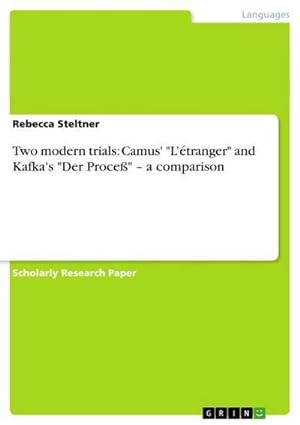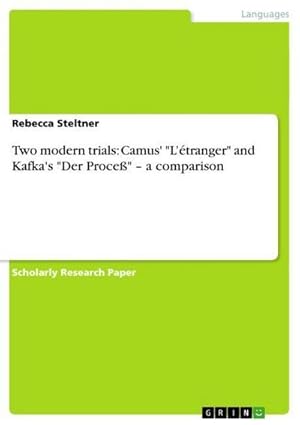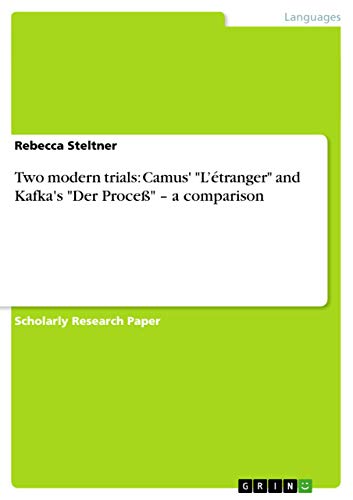9783638698702 - Two Modern Trials: Camus' L'Útranger and Kafka's Der Proce▀ - a Comparison by Steltner, Rebecca (3 results)
Product Type
- All Product Types
- Books (3)
- Magazines & Periodicals
- Comics
- Sheet Music
- Art, Prints & Posters
- Photographs
- Maps
-
Manuscripts &
Paper Collectibles
Condition
- All Conditions
- New
- Used
Binding
- All Bindings
- Hardcover
- Softcover
Collectible Attributes
- First Edition
- Signed
- Dust Jacket
- Seller-Supplied Images (2)
- Not Printed On Demand (2)
Seller Location
Seller Rating
-
Two modern trials: Camus' "L┐Útranger" and Kafka's "Der Proce▀" ┐ a comparison
Published by GRIN Verlag Sep 2007, 2007
ISBN 10: 363869870XISBN 13: 9783638698702
Seller: BuchWeltWeit Ludwig Meier e.K., Bergisch Gladbach, Germany
Book Print on Demand
Taschenbuch. Condition: Neu. This item is printed on demand - it takes 3-4 days longer - Neuware -Research Paper (undergraduate) from the year 2003 in the subject Romance Languages - Comparative Studies, grade: 67 Punkte (2+) (B+), University of Canterbury (School of European Culture and Languages), language: English, abstract: To begin with I shall present an overview of some of the most common or most debated interpretations of the two novels and the issues they raise. I also question whether it is legitimate to compare Camus' L'Útranger, which is often read alongside his philosophical essay Le Mythe de Sisyph,e to Kafka's Der Proce▀, which might be expressive of a philosophy but whose author only ever expressed himself in literary writing. In the following the novels are then compared simultaneously and their similarities and differences examined from different angles, such as their treatment of their common theme of 'law, guilt and trial' in part two, which I see partly under the aspect of the absurd. The idea of the absurd is also relevant when comparing the two main characters Josef K. and Meursault later on.For the further interpretation of both the characters, but especially to solve the riddles surrounding Meursault's nature and the questions of reader's sympathy, the narrative perspective is crucial and is examined in part four. Subsequently, the theme of philosophical ideas being expressed in literary form becomes important again as I look at the use of image and symbolism in L'Útranger and Der Proce▀ as well as at the genres of the French rÚcit and parable and the philosophical and literary implications of the choice of genre, symbolism or narrative perspective.Kafka's Der Proce▀ and Camus' L'Útranger have one important thing in common and that is that both are extremely rich novels which can be read according to a large number of codes (or preconceptions). Camus himself has praised Der Proce▀ 'It is the fate and perhaps the greatness of that work that it offers everything and confirms nothing', (Sisyphus, p. 124). This is certainly a principle that Camus aspires to in his own fiction and successfully as Thody confirms: 'L'Útranger seems to be inexhaustible in the different ways in which it can be analysed'3. I hope to be able to do justice to these many angles and show how rich these two novels are.To summarise some of the many interpretations of Kafka's Der Proce▀ let me begin with a political reading. 36 pp. Englisch.
-
Two modern trials: Camus' "L┐Útranger" and Kafka's "Der Proce▀" ┐ a comparison
Published by GRIN Verlag, 2007
ISBN 10: 363869870XISBN 13: 9783638698702
Seller: AHA-BUCH GmbH, Einbeck, Germany
Book
Taschenbuch. Condition: Neu. Druck auf Anfrage Neuware - Printed after ordering - Research Paper (undergraduate) from the year 2003 in the subject Romance Languages - Comparative Studies, grade: 67 Punkte (2+) (B+), University of Canterbury (School of European Culture and Languages), language: English, abstract: To begin with I shall present an overview of some of the most common or most debated interpretations of the two novels and the issues they raise. I also question whether it is legitimate to compare Camus' L'Útranger, which is often read alongside his philosophical essay Le Mythe de Sisyph,e to Kafka's Der Proce▀, which might be expressive of a philosophy but whose author only ever expressed himself in literary writing. In the following the novels are then compared simultaneously and their similarities and differences examined from different angles, such as their treatment of their common theme of 'law, guilt and trial' in part two, which I see partly under the aspect of the absurd. The idea of the absurd is also relevant when comparing the two main characters Josef K. and Meursault later on.For the further interpretation of both the characters, but especially to solve the riddles surrounding Meursault's nature and the questions of reader's sympathy, the narrative perspective is crucial and is examined in part four. Subsequently, the theme of philosophical ideas being expressed in literary form becomes important again as I look at the use of image and symbolism in L'Útranger and Der Proce▀ as well as at the genres of the French rÚcit and parable and the philosophical and literary implications of the choice of genre, symbolism or narrative perspective.Kafka's Der Proce▀ and Camus' L'Útranger have one important thing in common and that is that both are extremely rich novels which can be read according to a large number of codes (or preconceptions). Camus himself has praised Der Proce▀ 'It is the fate and perhaps the greatness of that work that it offers everything and confirms nothing', (Sisyphus, p. 124). This is certainly a principle that Camus aspires to in his own fiction and successfully as Thody confirms: 'L'Útranger seems to be inexhaustible in the different ways in which it can be analysed'3. I hope to be able to do justice to these many angles and show how rich these two novels are.To summarise some of the many interpretations of Kafka's Der Proce▀ let me begin with a political reading.
-
Two modern trials: Camus* "L*Útranger" and Kafka*s "Der Proce▀" - a comparison
Published by GRIN Verlag, 2007
ISBN 10: 363869870XISBN 13: 9783638698702
Seller: dsmbooks, Liverpool, United Kingdom
Book
paperback. Condition: New. New. book.




